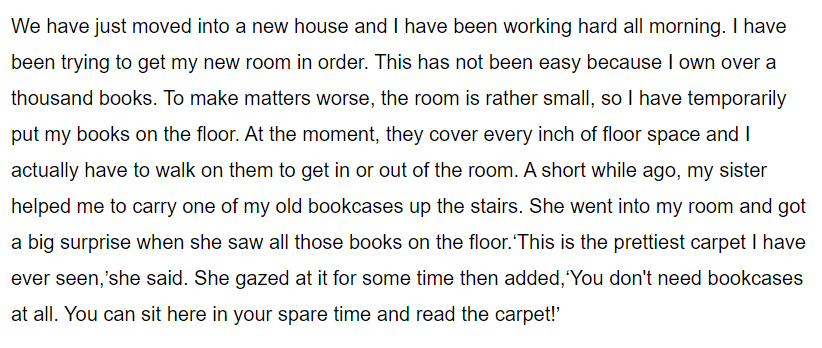Lesson 52 A pretty carpet 漂亮的地毯
1.原文

2. 参考译文

3. New words and expressions
★inch n. 英寸(度量单位)foot 英尺(pl. feet ); mile 英里
★space n. 空间 注意读音浊化, 六个爆破音中有三个清辅音 [] 在 [] 后面是要浊化为对应的三个浊辅音 [] 又如 school
★actually adv. 实际上=in fact
4. 课文讲解
1、We have just moved into a new house and I have been working hard all morning.
现在完成进行时用来强调动作在某一段时间内一直在进行,而且动作有现在的结果。现在完成时表示在漫长地时间段,过去发生的, 还一定要对现在产生影响;在过去发生的动作, 一直延续到现在,现在完成时, 动词一定是延续性动词
It has rained for half day. It has been raining.
2、I have been trying to get my new room in order.
get sth. in order 使……有秩序,把……整理好(get 使役动词)
in order 整齐,井然有序,有秩序, 有次序
3、This has not been easy because I own over a thousand books.
★own
① vt. 拥I own over a thousand books.
② vt. &vi. 承认He owned to stealing the wallet.
③ adj. 自己的He has a car of his own.
4、To make matters worse, the room is rather small, so I have temporarily put my books on the floor.
to make matters worse 更糟糕的是……,插入语
5、At the moment, they cover every inch of floor space and I actually have to walk on them to get in or out of the room.
at the moment = now 现在,此刻,目前
every inch 每一英寸(夸张)
Gold covered every inch of the ground in America.
It is worth every penny of it.
6、A short while ago, my sister helped me to carry one of my old bookcases up the stairs.
help sb. (to) do sth. 帮某人做某事(to 可省略)
help sb. with sth. 帮某人做某事
with one’s help 在某人的帮助下
7、‘This is the prettiest carpet I have ever seen,’ she said. “I have ever seen” 做定语从句出现, 是最高级的标志
8、She gazed at it for some time then added, ‘You don’t need bookcases at all. You can sit here in your spare time and read the carpet!’
gazed at 对……向往, 羡慕not at all 完全不,起强调作用in one’s spare time 某人空闲的时候,spare表示“空闲的,多余的”
5. Key structures
现在完成时,现在完成进行时
现在完成时:have done,表示已完成的动作
现在完成进行时:have been doing,强调动作在某一段时间内一直在进行,而且动作现在有结果。到现在为止,该动作可能已不再继续进行,也可能还在继续进行,这要根据上下文来确定。句子中常含有all+表示时间的词语如all day,all morning等或for和since。
I have read the book. 书已看完
I have been reading the book. 还没看完, 还要继续
表示持续性的动词,如learn,lie,live,rain,sleep,stand,可以同since或for副词短语连用,也可用于以how long开头的疑问句中:
I’ve been working for Exxon for 15 years.
现在完成进行时还可以表示经常重复的动作:Jim has been phoning Jenny every night for the last week. 与段时间连用可以用现在完成时, 也可以用现在完成进行时, 但跟次数连用的, 一定只能用完成时, 不能用现在完成进行时
He has rung me up five times since 12 o’clock.
6. 语法精髓
1、You should go to bed. You _____ (watch) TV for 5 hours.2、I _____ (write) letters since breakfast.
3、I _____ (write) 3 letters since breakfast.
4、Sorry, but Mr.Smith _____ (leave) for Beijing.
5、I _____ (look) for him everywhere, where can he be?1、have been watching/have watched
2、having been writing 3、have written 4、has left
和现在完成进行时连用的, 一定不能是次数;和现在完成进行时连用的动词, 一定不能是短暂动词,leave是瞬间动词5、have been looking 通过 “where can he be?” 这句话可知人没找到, 还要继续找
7. Special Difficulties
形容词、相应的副词及其用法:
许多副词,特别是表示方式的副词,皆由形容词加-ly构成,如easy(容易的)/easyly,beautiful(漂亮的)/beautifully。一些频度副词也如此构成,如usual(通常)/usually。还有少数几个表示程度及观点的副词也都以-ly结尾:high(高的)/highly(高度地),real(真的)/really。大多数形容词加 “ly” 变为副词 : 如 beautiful--beautifully,但是不是所有的形容词都可以加ly(asleep);不是所有的副词都一定以ly结尾(late);不是所有的加ly的都是副词(lovely)有些副词虽然由形容词加-ly构成,但在意义上与其相应的形容并不相同,如hard(勤奋的,困难的)/hardly(几乎不),cold(冷的)/coldly(冷淡的),late(迟到的,晚的)/lately(最近,近来),near(近的,接近的)/nearly(几乎,差不多,差点儿)。有些副词有两种形式。有的意义相同,如cheap(廉价的)/cheaply(廉价地),但有的意义不同如late(迟,晚)/lately(近来),hard(努力地,猛烈地)/hardly(几乎不)。late<adj. , adv.> 迟 ; lately adv. 近来(=recently)hard<adj. , adv.> 努力地(表示程度深), 困难地(=difficult) ;hardly几乎不high<adj.>高的 ,〈adv.>高度地 ;highly〈adv.> 高度地 (不能用尺度测量的, 抽象的)deep<adj. , adv.> 深的; deeply 〈adv.> 深度地 (不能用尺度测量的, 抽象的)near<adj. , adv.> 在旁边的 ;nearly 〈adv.> 几乎, 将近有些副词在形式上与形容词相同,如fast,past,far等。
大多数方式副词的位置一般在宾语或动词前面,表示时间的副词常位于句尾,有时也可位于句首。程度副词,如almost,enough,hardly,nearly,quite,rather,too等,大部分用在它们所修饰的动词之前。
副词修饰动词(walk quickly), 形容词(very beautiful), 副词词性本身(very much), 还可以修饰句子
